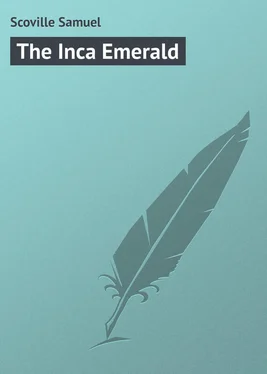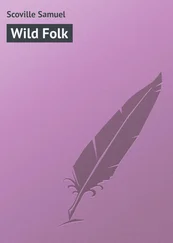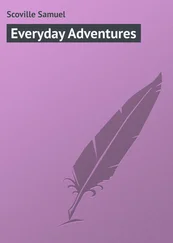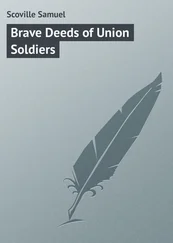Samuel Scoville - The Inca Emerald
Здесь есть возможность читать онлайн «Samuel Scoville - The Inca Emerald» — ознакомительный отрывок электронной книги совершенно бесплатно, а после прочтения отрывка купить полную версию. В некоторых случаях можно слушать аудио, скачать через торрент в формате fb2 и присутствует краткое содержание. Жанр: Прочие приключения, foreign_prose, на английском языке. Описание произведения, (предисловие) а так же отзывы посетителей доступны на портале библиотеки ЛибКат.
- Название:The Inca Emerald
- Автор:
- Жанр:
- Год:неизвестен
- ISBN:нет данных
- Рейтинг книги:4 / 5. Голосов: 1
-
Избранное:Добавить в избранное
- Отзывы:
-
Ваша оценка:
- 80
- 1
- 2
- 3
- 4
- 5
The Inca Emerald: краткое содержание, описание и аннотация
Предлагаем к чтению аннотацию, описание, краткое содержание или предисловие (зависит от того, что написал сам автор книги «The Inca Emerald»). Если вы не нашли необходимую информацию о книге — напишите в комментариях, мы постараемся отыскать её.
The Inca Emerald — читать онлайн ознакомительный отрывок
Ниже представлен текст книги, разбитый по страницам. Система сохранения места последней прочитанной страницы, позволяет с удобством читать онлайн бесплатно книгу «The Inca Emerald», без необходимости каждый раз заново искать на чём Вы остановились. Поставьте закладку, и сможете в любой момент перейти на страницу, на которой закончили чтение.
Интервал:
Закладка:
"Dat ain't no bushmaster, Mars' Jud," the latter called soothingly. "Dat was only a trail-haunting blacksnake. He like to lie next to a path an' stick up his ol' head to see who's comin', kin' o' friendly like."
"Friendly nothin'!" groaned Jud. "He's just bit me again."
As soon as Hen laid hold of Jud's jacket he found out what was the matter. The hawk had only been stunned by Jud's shot and, coming to life again, had promptly sunk his claws into the latter's back, and Jud had mistaken the bird's talons for the fangs of the bushmaster. Professor Ditson, who had hurried up, was much disappointed.
"If you ever meet a bushmaster, you'll learn the difference between it and a harmless blacksnake," he observed. "Probably, however," he went on thoughtfully, "it will be too late to do you much good."
"Why do all the snakes in South America pick on me?" complained Jud. "There don't seem to be nothin' here but snakes an' thorns."
It was Pinto who gave the old trapper his first favorable impression of the jungle. They had reached a deserted bungalow in the heart of the woods, which Professor Ditson had once made his headquarters a number of years before. There they planned to have lunch and spend the night. At the meal Jud showed his usual good appetite in spite of his misfortunes, but he complained afterward to Hen, who had attached himself specially to the old man, about the absence of dessert.
"I got a kind of a sweet tooth," he said. "You ain't got a piece of pie handy, have you?"
"No sah, no sah," replied Hen, regretfully. "You's about three thousand miles south ob de pie-belt."
"Wait," broke in Pinto, who had been listening. "Wait a minute; I get you something sweet," and he led the way to an enormous tree with reddish, ragged bark. Some distance up its trunk was a deep hollow, out of which showed a spout of dark wax nearly two feet long. In and out of this buzzed a cloud of bees.
"I get you!" shouted Jud, much delighted, "a bee-tree! Look out, boy," he went on, as the Indian, clinging to the ridges of the bark with his fingers and toes, began to climb. "Those bees'll sting you to death."
"South American bees hab no sting," explained Hen, as Pinto reached the wax spout, and, breaking it off, thrust his hand fearlessly through the cloud of bees into the store of honey beyond. A moment later, and he was back again, laden with masses of dripping honeycomb, the cells of which, instead of being six-sided, as with our northern bees, resembled each one a little bottle. The honey was clear and sweet, yet had a curious tart flavor. While Jud was sampling a bit of honeycomb, Pinto borrowed Hen's machete and cut a deep gash through the rough red bark of the tree. Immediately there flowed out from the cut the same thick, milky juice which they had seen at their first breakfast in South America. The Indian cut a separate gash for each one of the party, and they all finished their meal with draughts of the sweet, creamy juice.
"It sure is a land flowing with milk an' honey," remarked Jud, at last, after he had eaten and drunk all that he could hold.
"This vegetable milk is particularly rich in gluten," observed Professor Ditson, learnedly.
"I guess it'd gluten up a fellow's stomach all right if he drank too much of it," remarked Jud, smacking his lips over the sweet, sticky taste which the juice of the cow-tree left in his mouth.
After lunch, most of the party retired to their hammocks in the cool dark of the house for the siesta which South American travelers find an indispensable part of a tropical day. Only the scientist and Will stayed awake to catch butterflies through the scented silence of the forest where the air, filled with the steam and perfume of a green blaze of growth, had the wet hotness of a conservatory. When even the insects and the untiring tree-toads were silenced by the sun, Professor Ditson, wearing a gray linen suit with a low collar and a black tie, was as enthusiastic as ever over the collecting of rare specimens, and was greatly pleased at Will's interest in his out-of-door hobbies.
Together they stepped into the jungle, where scarlet passion-flowers shone like stars through the green. Almost immediately they began to see butterflies. The first one was a magnificent grass-green specimen, closely followed by others whose iridescent, mother-of-pearl wings gleamed in the sunlight like bits of rainbow. On a patch of damp sand a group made a cloud of sulphur-yellow, sapphire-blue, and gilded green-and-orange. The professor told Will that in other years he had found over seven hundred different kinds within an hour's walk from this forest bungalow, being more than double the number of varieties found in all Europe.
Deep in the jungle, they at last came to a little open stretch where the Professor had often collected before and which to-day seemed full of butterflies. Never had Will imagined such a riot of color and beauty as there dazzled his eyes. Some of the butterflies were red and yellow, the colors of Spain. Others were green, purple, and blue, bordered and spangled with spots of silver and gold. Then there were the strange transparent "glass-wings." One of these, the Hetaira esmeralda , Will was convinced must be the most beautiful of all flying creatures. Its wings were like clear glass, with a spot of mingled violet and rose in the center of each one. At a distance, only this shimmering spot could be seen rising and falling through the air, like the wind-borne petals of some beautiful flower. Indeed, as the procession of color drifted by, it seemed to the boy as if all the loveliest flowers on earth had taken to themselves wings, or that the rainbow-bridge of the sky had been shattered into fragments which were drifting slowly down to earth.
The largest of them all were the swallowtails, belonging to the same family as the tiger, and blue and black swallowtail, which Will had so often caught in Cornwall. One of that family gleamed in the sunlight like a blue meteor as it flapped its great wings, seven inches from tip to tip and of a dazzling blue, high above the tree-tops. Another member of the same family, and nearly as large, was satiny white in color. Professor Ditson told Will that both of these varieties were almost unknown in any collection, as they never came within twenty feet of the ground, so that the only specimens secured were those of disabled or imperfect butterflies which had dropped to the lower levels.
"Why couldn't I climb to the top of one of those trees with a net and catch some?" inquired Will, looking wistfully up at the gleaming shapes flitting through the air so far above him.
"Fire-ants and wasps," returned the professor, concisely. "They are found in virtually every tree. No one can stand the pain of an ant's bite, and one sting of a Maribundi wasp has been known to kill a strong man."
That night, tired out by their long day of hunting, the whole party went to bed early. Will's sleeping-room was an upper screened alcove, just large enough to hold a single hammock. Somehow, even after his long hard day, he did not feel sleepy. Great trees shadowed his corner, so thick that even the stars could not shine through their leaves, and it seemed to Will as if he could stretch out his hands and lift up dripping masses of blackness, smothering, terrifying in its denseness. From a far-away tree-top the witch-owl muttered over and over again that mysterious word of evil, "Murucututu, murucututu," in a forgotten Indian tongue. He had laughed when Pinto told him a few nights before that the owl was trying to lay a spell on those who listened, but to-night in the dark he did not laugh.
Then close at hand in a neighborhood tree-top sounded a beautiful contralto frog-note slowly repeated. "Gul, gul, gul, gul, guggle, gul, guggle," it throbbed. The slow, sweet call gave the boy a sense of companionship, and he fell asleep with the music of it still sounding in his ears.
Читать дальшеИнтервал:
Закладка:
Похожие книги на «The Inca Emerald»
Представляем Вашему вниманию похожие книги на «The Inca Emerald» списком для выбора. Мы отобрали схожую по названию и смыслу литературу в надежде предоставить читателям больше вариантов отыскать новые, интересные, ещё непрочитанные произведения.
Обсуждение, отзывы о книге «The Inca Emerald» и просто собственные мнения читателей. Оставьте ваши комментарии, напишите, что Вы думаете о произведении, его смысле или главных героях. Укажите что конкретно понравилось, а что нет, и почему Вы так считаете.












